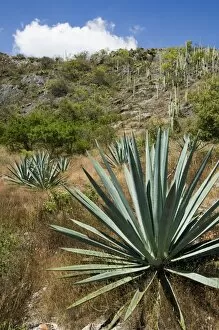Agave Cactus Collection
The agave cactus, also known as the "blue agave, " plays a vital role in the booming tequila industry
For sale as Licensed Images
Choose your image, Select your licence and Download the media
The agave cactus, also known as the "blue agave, " plays a vital role in the booming tequila industry. This succulent plant is not only responsible for producing one of Mexico's most famous spirits but also embodies traditional farming techniques that have been passed down through generations. Found primarily in the region of Tequila, Jalisco, the blue agave thrives in arid and volcanic soil. Its unique characteristics make it ideal for making Mezcal, a distilled alcoholic beverage similar to tequila. The process begins with harvesting mature plants that can take up to 10 years to reach full maturity. The cultivation of agave cacti requires immense patience and expertise. Farmers carefully tend to each plant, ensuring they receive just the right amount of water and sunlight while protecting them from pests and diseases. These traditional farming techniques are deeply rooted in Mexican culture and have been honed over centuries. In recent years, there has been an increasing demand for tequila worldwide, leading to a surge in production. However, this boom has raised concerns about sustainability as large-scale farms often prioritize quantity over quality. Many farmers continue to advocate for preserving traditional methods that prioritize environmental conservation and maintain high standards. Through captivating images captured by photographers at The Wider Image project titled "Tequila boom rooted in traditional farming techniques, " we witness the beauty of these majestic blue agaves against the backdrop of rural landscapes. These photographs serve as a reminder of the importance of sustainable agriculture practices that respect both nature and tradition. As we raise our glasses filled with golden-hued tequila made from these remarkable agave cacti, let us toast not only to its exquisite taste but also to those who dedicate their lives to preserving Mexico's rich cultural heritage through their commitment to sustainable farming practices.




